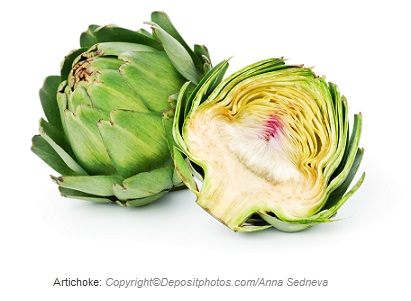Artichoke is the large bud of a thistle plant. This edible thorn is not that common among  people. A medium artichoke weighs about 130 grams and its nutritional value is as follows: carbohydrates 14 grams, protein 4 grams, and fiber 8 grams with soluble fiber more than insoluble fiber.
people. A medium artichoke weighs about 130 grams and its nutritional value is as follows: carbohydrates 14 grams, protein 4 grams, and fiber 8 grams with soluble fiber more than insoluble fiber.
Average calories: 72 per one medium artichoke.
|
Artichoke: one medium |
|
|
Carbohydrate |
14 |
|
Fiber |
8 |
|
Protein |
4 |
|
Fat |
0 |
|
Calories |
72 |
Vitamins found in higher amounts: vitamins C, K and B9.
Minerals found in higher amounts: magnesium, copper, manganese, potassium and phosphorous.
Phytonutrients found in higher amounts and their health benefits: artichoke is high in the antioxidants lutein and zeaxanthin. They are naturally occurring carotenoids that promote healthy vision and eyes. Lutein and zeaxanthin are found with higher amounts in kale, turnip greens, spinach, Swiss chard, collard, and watercress.
An active compound of artichoke is cynarine, which stimulates biliary secretion and improves the function of the gallbladder.
Other important phytonutrients are apigenin and luteolin. They are flavonoids with some health benefits. Apigenin is found in parsley, celery and chamomile tea as well and can block the liver enzyme Cytochrome P450 2C9, which is responsible for the metabolism of many medications. Luteolin has an anti-inflammatory effect by inhibiting interleukin-6.
It is also claimed that apigenin may stimulate the growth of the nerve cells. This is why apigenin and luteolin might be beneficial in Multiple Sclerosis (MS). Artichoke may help with poor digestion, gallbladder dysfunction, and irritable bowel syndrome (IBS), and reduces risk of heart diseases by lowering bad cholesterol.

